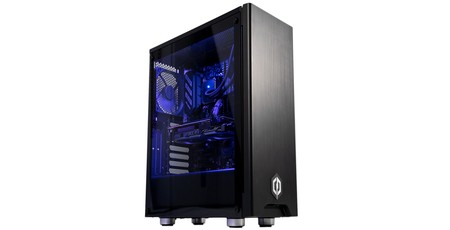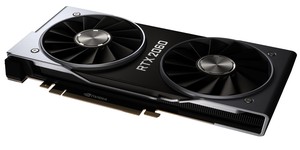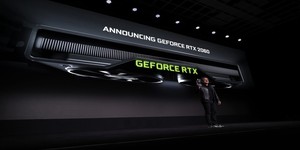
Performance Analysis
Deus Ex is a punishing title at Ultra and should be treated as a worst-case scenario game (it’s why we use it). As such, the fact that the system remains playable even at 4K indicates that it will handle nearly everything you throw at it. We’re of the belief that 1440p is a much better resolution to game at (much higher frame rates but still very sharp), and it’s certainly the resolution that the RTX 2080 is most comfortable at. Paired with a high refresh rate 1440p G-Sync panel (maybe even a HDR one), your gaming experience would be excellent. The 3DMark Fire Strike (DX11) scores are below those of PCs with GTX 1080 Tis, but that likely comes down in part to the lack of a CPU overclock too. In the DX12 Time Spy test and in VRMark, the Infinity X99 RTX is at the top of the pecking order.

The lack of overclock doesn’t hamper our CPU in Handbrake; it manages to trump systems using the Ryzen 7 2700X and Core i7-8700K (both overclocked), only falling short of the 8c/16t Core i7-7820X in the Dino PC system. However, we do see it lose out to quite a few systems, albeit marginally, in Cinebench, so we still firmly believe an overclock should be applied.
PCMark 10 taps into openCL and GPU acceleration, and in this test the RTX 2080 sends it to the top of the class.
The primary SSD may be a little lacking in capacity, but its speed can’t be faulted. The use of a NVMe drive means this will be a responsive system for years to come, and games will load fast, assuming you can fit them on.

Power consumption is where you’d expect, and sub-500W peak consumption means the Bronze-rated PSU shouldn’t strain too hard meeting demand.
Thermals and noise are impressive here. While it’s irksome that the GPU fans do not switch off, overall system noise when idle is low. Even when under full load, neither the GPU nor the CPU cooler gets too loud; we’d be happy to use this even on a desk next to us, though it’s certainly not silent. GPU and CPU temperatures were comfortably below 75°C and 80°C respectively, and there was no sign of throttling.
Conclusion
While building a gaming PC on a reasonable budget and getting a good experience is still viable, for those who like to live on the higher end of the spectrum, things are getting more and more expensive. Intel’s 9th Gen Core CPUs and Nvidia’s RTX hardware are prime examples; the two parts here are both the mid-tier entries in their respective stacks, yet they retail for north of £1,000 when combined.
As such, Cyberpower’s ability to deliver them in a system below £2,000 is actually commendable, even if the overall price tag still feels very high. You can buy the same specification in separate parts for around £1,800, so the £150 (just over eight percent) on top of this seems mostly justified given that the build quality is professional and the warranty decent (though not a leader in the field). We stand by our position that the lack of an overclock is to this system’s detriment, though; Cyberpower could do with including it for free for certain tiers of systems, this being one of them.

Cyberpower has played it very safe aesthetically, but you have numerous options for expanding upon this in the excellent configurator. The same is true of the main hardware, and we’d absolutely recommend a 500GB SSD, for example.
Expensive though it is, the combination of the Core i7-9700K and RTX 2080 is undeniably powerful, blazing through our tests with ease. With GTX 1080 Ti stock now thin on the ground and expensive when you can find it, the RTX 2080 is the only realistic choice for this level of GPU horsepower. This system will be a 1440p powerhouse, and it’ll achieve this status without making much noise and while also offering solid potential in creative workflows. However, if the latter are going to feature heavily in your computing life, the Core i9-9900K may well be worth the £184 upgrade, or you might prefer to save cash and opt for a different Ryzen-based system instead, as the Ryzen 7 2700X is a far better CPU in multi-threaded workflows, and it's only gaming where Intel still rules the roost. In short, we just don't rate the Core i7-9700K highly at all when the wider CPU market is considered.
While not a perfect system, the Infinity X99 RTX set out to deliver the latest Intel and Nvidia hardware at a (relatively) reasonable price, and it manages to do so while also being efficient, quiet, cool, and clean looking with a tad of RGB customisation thrown in. If you want outstanding gaming performance and are less concerned about having loads of extra niceties, it could certainly find a decent home on your desk. However, even though the customisation engine can be used to remedy a lot of the flaws with the Infinity X99 RTX (older audio codec, small SSD, poor value CPU, no overclock), there are one too many qualms with the component choices for us to recommend it wholeheartedly.

MSI MPG Velox 100R Chassis Review
October 14 2021 | 15:04








Want to comment? Please log in.